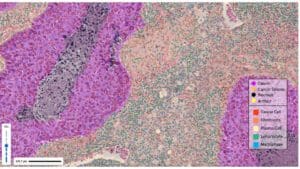
Digital pathology slide. [Image courtesy of PathAI]
“The success of the initial partnership set the stage for the expanded and exclusive partnership announced in February, 2024,” Brown said. That collaboration “creates the conditions for PathAI and Roche to focus their resources in realizing the first AI-driven companion diagnostics in the near future with our mutual biopharma partners,” he added.
Roche has already integrated PathAI’s PDL1 scoring algorithms into its Navify Digital Pathology platform, intended to support more accurate and reliable scoring of complex biomarkers incorporated into biopharma precision medicine strategies.
Immuno-oncology and ADCs drive demand for AI-backed diagnostics
In recent years, growing investment in immuno-oncology (IO) and antibody drug conjugates (ADCs) has fueled demand for companion diagnostics and precision medicine. ADCs, especially, often require AI-enabled companion diagnostics. This is because traditional manual pathologist scoring approaches can struggle to reliably identify patients with low biomarker expression, who might still respond to ADC treatments. The observed patient response in low-biomarker expressing populations can be difficult to identify reliably through manual pathologist scoring alone. Additionally, precision medicine is expanding beyond oncology into areas like immunology and inflammation – a focus for both PathAI and Roche.
The PathAI toolkit for AI-powered diagnostics
In the partnership, PathAI will share its machine learning expertise, including its novel AI generalization and validation methods and techniques, a proprietary network of pathologists for annotations, and its translational research partnership portfolio with biopharma partners. These tools will address key challenges in developing AI-enabled companion diagnostics drawing from PathAI’s established machine learning models. In addition to commercializing algorithms through Navify Digital Pathology, PathAI will continue to separately distribute its AISight Image Management System along with compatible algorithms to streamline workflows and assist pathologists globally. The platform remains available to support pharma biomarker and drug development programs outside companion diagnostics.
PathAI says its experience supporting translational research and clinical development in indications like non-alcoholic steatohepatitis (NASH), inflammatory bowel disease (IBD), breast cancer, and neoadjuvant oncology studies has prepared the company for this expanded role in companion diagnostics development. The collaboration aims to establish AI as the standard for companion diagnostics and improve patient outcomes by leveraging digital pathology’s potential throughout drug development.
Filed Under: Drug Discovery, machine learning and AI



